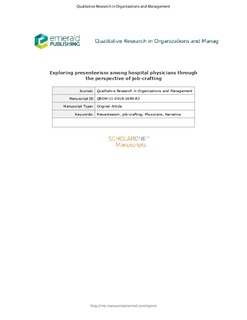Exploring presenteeism among hospital physicians through the perspective of job crafting
Journal article, Peer reviewed
Accepted version

Åpne
Permanent lenke
http://hdl.handle.net/11250/2620695Utgivelsesdato
2019Metadata
Vis full innførselSamlinger
- Institutt for psykisk helse [1301]
- Institutt for psykologi [3103]
- Publikasjoner fra CRIStin - NTNU [38127]
Originalversjon
10.1108/QROM-11-2018-1699Sammendrag
Purpose
The purpose of this paper is to seek a deeper understanding of presenteeism by utilising the perspective of job crafting to explore how a selected group of physicians make sense of their decision to attend work while ill and of their experience of doing so. Job crafting implies that employees not only respond to their job description, but also proactively change tasks, relationships and perceptions in order to experience work in meaningful ways.
Design/methodology/approach
A narrative methodological framework involving interviews was adopted to explore the ways in which a selected group of 20 Norwegian hospital physicians engaged in job crafting during presenteeism. The resulting data were analysed using theory-led thematic analysis utilizing the theoretical perspective of job crafting.
Findings
It was evident that physicians were indecisive and insecure when evaluating their own illness, and that, via task, relational and cognitive crafting, they trivialised, endured and showcased their illness, and engaged in presenteeism in various ways. Furthermore, physicians to some extent found themselves caught in dysfunctional circles by contributing to the creation of a work environment where presenteeism was maintained and seen as expected.
Research limitations/implications
Future research should address a wider range of contexts, and use longitudinal methods to explore the multifaceted, context-specific and evolving nature of presenteeism and job crafting in more depth. Interventions aimed at countering the negative implications of presenteeism should address the issue from both a social and a systemic point of view.
Originality/value
The findings extend the current understanding of presenteeism by demonstrating the multifaceted and evolving nature of the ways in which personal illness and presenteeism are perceived and enacted over time.